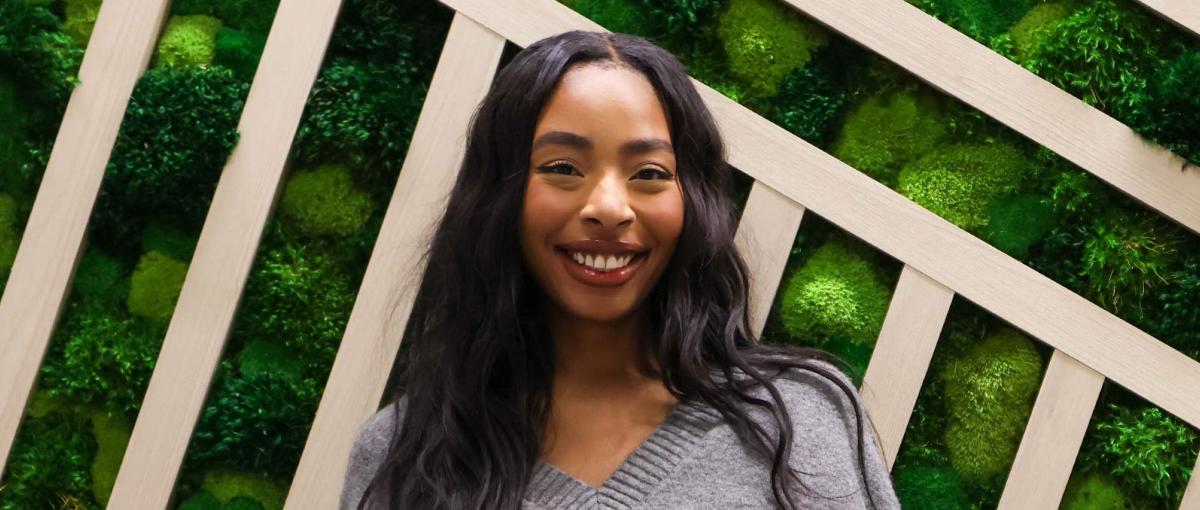Meet Ashlee Robinson-Anagor, stewardship lead, Covenant Foundation

February 28, 2024
By Gwendoline Hunka, communications advisor
As someone who balances her roots in Canada with roots in Grenada and Nigeria, Ashlee Robinson-Anagor, the stewardship lead for Covenant Foundation, looks forward to Black History Month every year.
“My cultural identity is important to me, even more so now as an adult because it provides a specific lens and perspective that I view my life through and apply to everything from jobs to dating. It allows me to connect with my heritage — especially during Black History Month — because it also gives me a greater sense of belonging and community.”
Although she grew up in Canada in a predominantly white neighbourhood, Ashlee practiced her family’s cultural traditions such as eating Grenadian and Nigerian food and participating in African dance classes. Her parents also underscored education, and after school, she received tutoring from the Council of Canadians of African and Caribbean Heritage, for whom she would later go on to volunteer as a tutor herself.
“The pursuit of education has very much shaped my career. As a first-generation Canadian, I was raised thinking it would be really difficult getting where you want to be without it, and my mom also wanted to make sure we stayed connected to the community and recognized the importance of giving back and the contributions of our ancestors.”
In addition to her work with the foundation, Ashlee is one of the newest members of Covenant’s Black Advisory Body. She’s looking forward to making connections with the greater Covenant community and finding ways to address the inequalities faced by Black people in health care.
“I do believe there are biases and systemic racism in the healthcare system. There are a lot of studies that show high mortality rates for Black women during birth, which leads to deep-rooted mistrust in the healthcare system. People will stop seeking out care if they feel like their issues are being neglected or pushed to the side.”
Ashlee believes that education is key to providing better care for marginalized people.
“For a lot of people, it comes down to a lack of understanding,” she says. “So when we increase education and awareness about how to provide culturally and racially sensitive care, it affects the whole system — and for Black people it can mean the difference between life and death.”
In Igbo:
Dịka onye na-edozi mgbọrọgwụ ya na Canada na mgbọrọgwụ na Grenada na Nigeria, Ashlee Robinson-Anagor, onye ndu nlekọta maka Covenant Foundation, na-atụ anya Ọnwa nke Akụkọ ihe mere eme Ojii kwa afọ.
“Amara omenala m dị m mkpa, ọbụna karịa ugbu a dị ka onye toro eto n'ihi na ọ na-enye otu oghere na echiche nke m ji na-ele ndụ m anya ma tinye n'ọrụ n'ihe niile site na ọrụ ruo na mkpakọrịta nwoke na nwaanyị. Ọ na-enye m ohere ijikọ ihe nketa m — ọkachasị n’oge Ọnwa nke Akụkọ ihe mere ndi Ojii — n'ihi na ọ na-emekwa ka m nwee mmetụta nke ịbụ onye na obodo.”
N'agbanyeghị na ọ tolitere na Canada na mpaghara ndị ọcha kachasi biri, Ashlee na ezinụlọ ya na-eme omenala ha dị ka iri nri Grenadian na Nigeria na isonye na klas ịgba egwu ndi Africa. Ndị mụrụ ya kwusiri ike na agụmakwụkwọ, mgbe ụlọ akwụkwọ gasịrị, ọ natara nkuzi site na Council of Canadians of African and Caribbean Heritage, bụ ndị ọ ga-emesị gaa n'ihu na-ewepụta onwe ya dị ka onye nkuzi n'onwe ya.
“Ịchụso agụmakwụkwọ ahaziela ọrụ m bụrụ nke ukwuu. Dị ka onye Canada nke ọgbọ mbụ, a zụlitere m n'echiche na ọ ga-esiri gị ike ịnweta ebe ịchọrọ ịnọ na-enweghị ya, nne m chọkwara ịhụ na anyị na obodona any na-akpakọrịta — ma ghọta na ọ dị mkpa inyeghachi ihe na onyinye nke nna nna anyị hà.”
Na mgbakwunye na ọrụ ya na ntọala ahụ, Ashlee bụ otu n'ime ndị otu kachasị ọhụrụ nke Òtù Ndụmọdụ Ojii nke Covenant. Ọ na-atụ anya ime njikọ na obodo Covenant ka ukwuu na ịchọta ụzọ isi dozie ahaghị nhata nke ndị Ojii chere ihu na nlekọta ahụike.
“Ekwenyere m na enwere ịkpa ókè echiche na ịkpa ókè agbụrụ na usoro ahụike. Enwere otutu ihe omumu nke gosiputara oke onwu maka umu nwanyi Ojii n'oge ọmụmụ nwa, nke na-eduga na enweghị ntụkwasị obi miri emi na usoro ahụike. Ndị mmadụ ga-akwụsị ịchọ nlekọta ma ọ bụrụ na ọ dị ha ka a na- eleghara nsogbu ha anya ma ọ bụ kwaga ya n'akụkụ.”
Ashlee kwenyere na agụmakwụkwọ bụ isi ihe na-enye nlekọta kacha mma nye ndị a kpapụrụ iche.
“Nye ọtụtụ ndị mmadụ, ọ na-abịara ha enweghị nghọta,” Ọ kwuru, sị. “Ya mere, mgbe anyị na-amụba agụmakwụkwọ na mmata banyere otu esi enye nlekọta omenala na nke agbụrụ, ọ na-emetụta usoro dum — ma maka ndị Ojii ọ nwere ike ịpụta ọdịiche dị n'etiti ndụ na ọnwụ.”